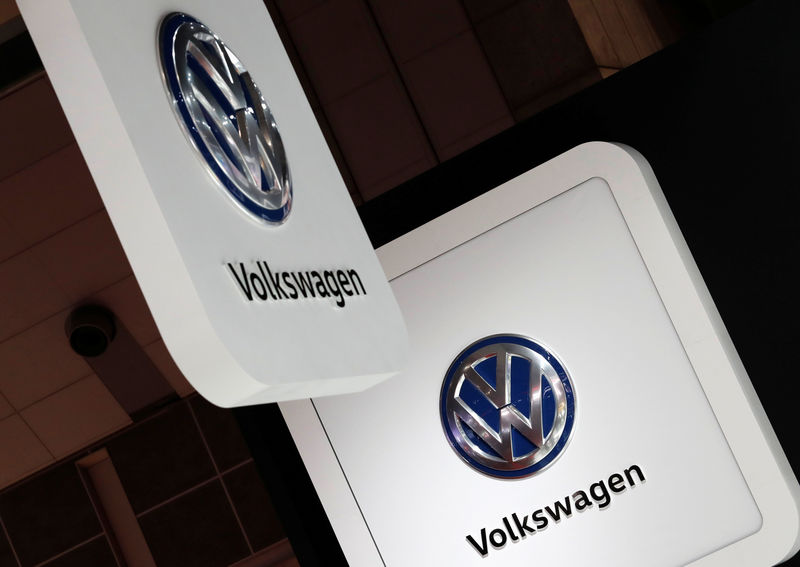By Axel Schmidt, Christoph Steitz and Christina Amann
WOLFSBURG, Germany (Reuters) -Volkswagen plans to shut at least three factories in Germany, lay off tens of thousands of staff and shrink its remaining plants in Europe’s biggest economy as it plots a deeper-than-expected overhaul, the carmaker’s works council head said on Monday.
Europe’s biggest carmaker has been negotiating for weeks with unions over its plans to revamp its business and cut costs, including considering plant closures on home soil for the first time in a blow to Germany’s industrial prowess.
Volkswagen (ETR:) reiterated on Monday that restructuring was needed and said it would make concrete proposals on Wednesday.
“Management is absolutely serious about all this. This is not sabre-rattling in the collective bargaining round,” Daniela Cavallo, Volkswagen’s works council head, told employees at the carmaker’s biggest plant, in Wolfsburg, threatening to break off talks.
“This is the plan of Germany’s largest industrial group to start the sell-off in its home country of Germany,” Cavallo added, not specifying which plants would be affected or how many of Volkswagen Group’s roughly 300,000 staff in Germany could be laid off.
The comments mark a major escalation of a conflict between Volkswagen’s workers and the group’s management, which is under severe pressure from high energy and labour costs, stiff Asian competition, weakening demand in Europe and China and a slower-than-expected electric transition.
They also heap further pressure on the German government to act on persistent weakness of its economy, which faces a second successive year of contraction with Chancellor Olaf Scholz’s coalition searching for ways to spur growth. Scholz trails in the polls with federal elections due next year.
Volkswagen said in a statement that it would make proposals for how to cut labour costs on Wednesday, when workers and management meet for the second round of wage talks and the carmaker releases third-quarter results.
“The situation is serious and the responsibility of the negotiating partners is enormous … Without comprehensive measures to regain competitiveness, we will not be able to afford essential investments in the future,” Volkswagen Group board member Gunnar Kilian said.
Thomas Schaefer, who heads the Volkswagen brand division, said German factories were not productive enough and were 25-50% above targeted costs, meaning some sites were twice as expensive compared to the competition.
Volkswagen said it remained committed to finding solutions for the situation jointly with labour representatives.
Volkswagen shares were down more than 1% after the announcement. Shares of peer Mercedes Benz (ETR:) also fell. VW shares have lost 44% of their value over the past five years, compared with a drop of 12% for Renault (EPA:) and a gain of 22% for Stellantis (NYSE:).
“Yes, the plans go far beyond market expectations,” said Daniel Schwarz, an analyst at Stifel.
“I believe this reflects a unique combination of unfavourable factors: competition in China, softening of demand in Europe, especially for BEVs (battery-powered electric vehicles), stricter regulation.”
Strikes, which had been threatened for the start of December, were now likely, Schwarz said, even though it was at least encouraging that the unions seemed to agree that significant action was needed.
Cavallo said Berlin needed to urgently come up with a masterplan for German industry to ensure it does not “go down the drain”.
A government spokesperson said Berlin was aware of Volkswagen’s difficulties and remained in close dialogue with the company and worker representatives.
“The Chancellor’s position on this is clear, however, namely that possible wrong management decisions from the past must not be to the detriment of employees. The aim now is to maintain and secure jobs,” the spokesperson told a regular briefing.
Cavallo said there was agreement between workers and the board regarding the nature of the problems the carmaker, and many of its European peers, faces.
“We are not far apart when it comes to analysing the problems. But we are miles apart on the answers to them,” he said.
His comments follow more bad news for German carmakers last week, with Mercedes-Benz (OTC:) vowing to step up cost-cutting measures after its earnings shrank.
Porsche, which is majority-owned by Volkswagen, meanwhile said it was paring back its dealership network in China to reflect weak demand in the world’s largest auto market, also flagging billions of euros in cost cuts.
German carmakers also fear being caught in the crosshairs of a trade war between the European Union and China, with hefty EU tariffs on Chinese electric vehicles set to come into force this week.
Read the full article here















